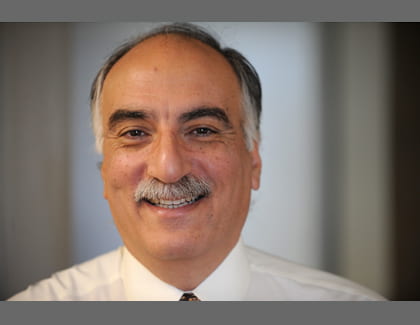Natural remedies: help or hype?
Doctor urges patients to carefully evaluate natural remedies and supplements

Millions of Americans use dietary supplements and herbal remedies every day, but do they really know what they’re taking? Dr. Wadie Najm isn’t so sure.
The UC Irvine geriatrician with the Susan Samueli Center for Integrative Medicine says the beneficial effects of many herbal, mineral and vitamin supplements are supported by good scientific evidence. But there is also unsupported hype about some products, and, in a few cases, supplements may be dangerous if taken with other remedies or medicines. Marketing claims make it even more difficult to distinguish helpful remedies from hucksterism.
“There are all these hot products,” Najm says. “Last year it was one thing, this year it’s something else and the next year it will be something else again. Questions and controversies about their use can make choices very difficult for consumers.”
Najm is on the forefront of integrating alternative therapies with traditional medical practices. He is trained in acupuncture and offers alternative therapies to his patients at the Samueli Clinic and Gottschalk Medical Plaza on campus.
“My patients got me interested in these treatments,” he says. “I studied geriatrics and ethnogeriatrics, which looks at beliefs and practices of different cultures, and I have to look further than these subjects to answer patients’ questions. Working with them is a collaboration because many are taking supplements with or without our knowledge. If we are not on the same page, it can be dangerous for them.”
Not all doctors are equally well-schooled in alternative therapies, and Najm says a pharmacist or naturopath can answer questions.
“What is overkill for one person is absolutely necessary for another. You cannot generalize without a detailed consultation.”
Najm recommends Web sites, such as the Natural Standardand Natural Medicine Comprehensive Database, that provide information about supplements and possible interactions.
Product quality also is an issue. The U.S. Food and Drug Administration recently established its Current Good Manufacturing Practice regulations that provide safety standards for dietary supplement companies. Najm notes several commercial resources that identify quality products, such as Consumer Lab, U.S. Pharmacopeia and NSF International.
This holistic approach is at the heart of the Samueli Center’s efforts to bridge the gap between traditional Chinese and modern Western medicine. Its mission is to advance knowledge and healthcare through education, evidence-based research and clinical practice applying integrative medical therapies. The center’s research and knowledge are put into practice at itsIrvine-area clinics, where patients receive integrative medical care to manage medical conditions and prevent disease.
Najm says he often recommends herbs and dietary supplements to his patients, “But never as stand-alone therapies. They are just one part of a comprehensive plan that includes medical treatment, diet and exercise.”